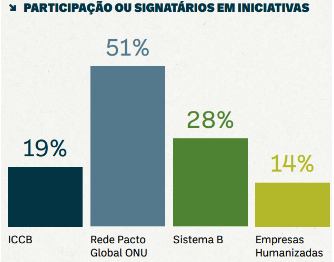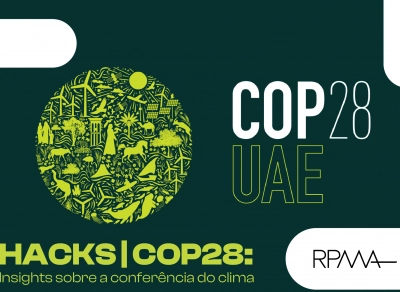ESG stands for Environmental, Social, and Governance practices of an organization. The term was coined in 2004 in a publication by the Global Compact in partnership with the World Bank, titled “Who Cares Wins.”
Overview
The environmental category stands out, with an 84% increase from 2019 to 2020 in initiatives adopted by companies.
Establishing internal compliance and governance mechanisms to inhibit unfair practices within companies is the most adopted practice currently (47%). While creating governance committees and instances that contribute to the organization’s integrity represents 33%.
ESG investments could reach $53 trillion by 2025.
Amid the pandemic, 77% of investors worldwide increased their investments in ESG.
Asset managers’ most observed ESG criteria are transparency (92%) and ethics (92%).
Highlights in the environmental aspect include the use of natural resources (76%), clean technology (71%), and pollution (71%). In the social realm, attention is drawn to human rights observance (73%).
Strategic actions for companies in each area
E – practice actions to preserve the planet, protecting natural resources;
S – ensure a non-toxic work environment, engaging in actions to reduce social inequality, such as diversity policies;
G – ensure the security of information and transactions, educating employees and monitoring processes to ensure company compliance.
Initiatives and Movements Promoting ESG
Global Compact: launched in 2000 by former UN Secretary-General Kofi Annan, the Global Compact calls on companies to align their strategies and operations with the Ten Principles in the areas of Human Rights, Labor, Environment, and Anti-Corruption and to develop actions that contribute to addressing society’s challenges. It is the world’s largest corporate sustainability initiative, with over 16,000 members in 160 countries. Those who join the Global Compact are responsible for contributing to achieving the 17 Sustainable Development Goals (SDGs).
SBTi (Science-Based Targets): this initiative is a collaboration between CDP, the United Nations Global Compact, the World Resources Institute, and WWF. It drives climate action in the private sector, enabling organizations to set emission reduction targets based on science that aligns with the Paris Agreement’s goals.
Sistema B: the global B Corp movement seeks to create a transformation ecosystem through companies in various economic sectors. A “B Corp” must have certification issued by B Lab, a nonprofit American entity. To obtain the certificate, companies are assessed in 5 main areas: governance, employees, customers, community, and the environment.
Despite the high popularity of the ESG theme, 69% of companies are not part of the ecosystem of initiatives related to this principle.

Sources: Pacto Global, Forbes, Estudo A Evolução do ESG, Exame, Endeavor, Anbima, Cause, BravoGRC.





 How can we help?
How can we help?